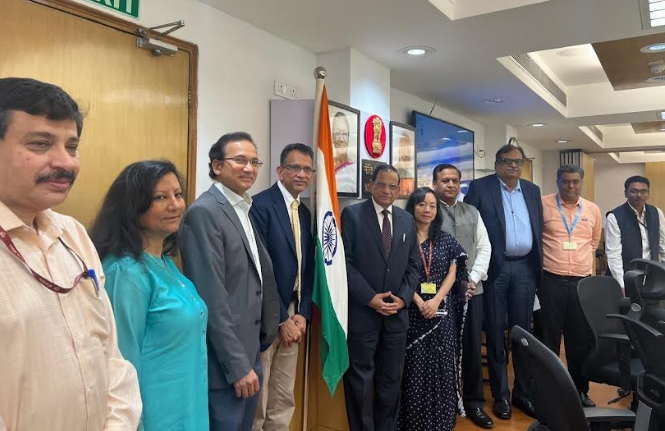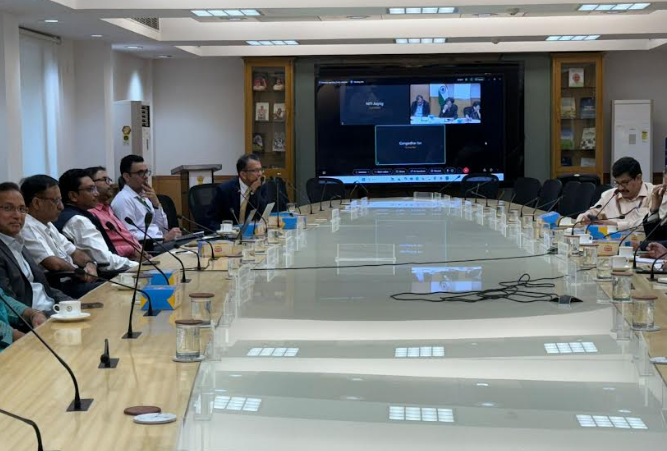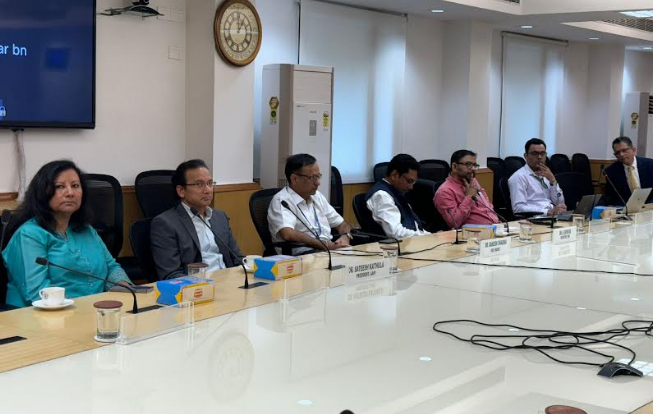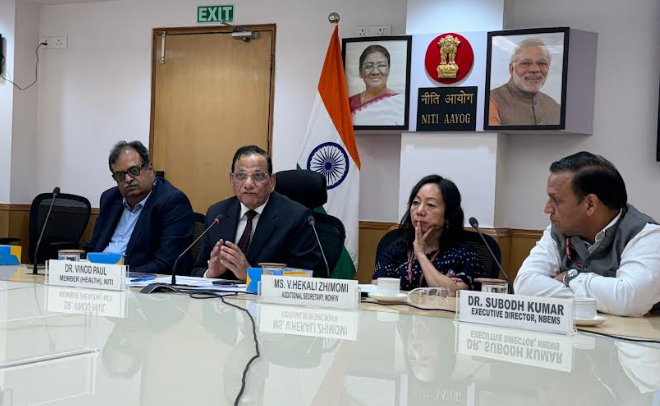America
During Meeting with India’s Ministry of Health and NITI Aayog Officials, AAPI Leadership Emphasizes Importance of Family Practice Specialized Medical Education

Ajay Ghosh
Media Coordinator, AAPI
India, home to one of the oldest medicinal systems in the world has made remarkable progress in streamlining and working towards enhancing medical education in recent years. As the world is evolving to meet the ever-changing needs, medical education in India is moving forward with the objective of enabling every medical graduate and postgraduate to be the best in the world.
Several changes are being made for graduate and post graduate medical education in Indian medical education system to be at par and for easy mobilization around the world, with the goal of making India the medical education hub for the world.
In this context, the American Association of Physicians of Indian Origin (AAPI), which has been leading efforts to help streamline medical education in India to meet the global standards, had a meeting on October 18th, 2024 with the officials of the Indian Government during the ongoing Global Healthcare Summit in New Delhi, with the objective of advocating for and emphasizing the importance of Family Practice Specialized Medical Education in India.
AAPI delegation was led by Dr. Sateesh Kathula, President, AAPI, Dr. Lokesh Edara, Past Chairman of AAPI BOT and Global Medical Education, and Dr. Vasu Singh, AAPI Regional Director.
AAPI leaders met with the leadership council at National Institute for India Transformation (NITI) Aayog Bhavan, led by Dr. Vinod Paul, Medical Director, NITI. Key attendees included Dr. Abhijath Sheth, President of National Board of Medical Exams (NBME), Chair of National Medical Council; Ms. V. Hekali Zhimomi, Additional Secretary, Ministry of Health and Family Welfare; Dr. B. Srinivas, Secretary, NMC; Dr. Subodh Kumar, Executive Director, NBEMS; Shri Rajib Kumar Sen, NITI Aayog Program Director.
Dr. Kathula shared with the Indian officials about the model of family medicine in the US and emphasized the need to expand family medicine departments and post graduate seats in India. He also shared the benefits of having family medicine in rural areas and small cities and making 2-3 year residency program mandatory after 5 1/2 years of medical education similar to the United States, which can improve quality of care significantly.
Dr. Kathula suggested that “Family medicine should not be a gatekeeper for referrals to specialists but rather they should be taking care most of the medical conditions including Pediatric and Obstetrics and Gynecology patients. In addition, he recommended creating incentives such as offering sub specialties like geriatrics, palliative care similar to the US, in order to attract more doctors towards family medicine. He said, “There should be clear distinction between general medicine and family medicine and change the name of general medicine to internal medicine to avoid confusion.”
In his presentation to the Indian officials, Dr. Lokesh Edara highlighted as to how in the Unted States and United Kingdom, there is an allocation of 25% of Post Graduate Medical Seats given to Family Practice. He advocated that Indian allocate a minimum of 25,000 per year to Family Practice PG Medical students, which will be a significant step towards enhancing healthcare in India. Describing the initiative as “a historic milestone and a testament to the commitment of AAPI towards Global Medical Education,” Dr. Lokesh Edara said, “This strategic move is crucial for strengthening primary healthcare and addressing the needs of diverse populations across the country.”
“AAPI is indeed a powerful platform for advocacy in healthcare. We encourage all the AAPI members to actively participate in these efforts. By collaborating and leveraging our collective voices, we can effectively advocate for policies and initiatives that enhance healthcare access, improve education, and support the well-being of communities both in India and the U.S. Your involvement can make a significant impact,” Dr. Edara added.
The high-ranking officials of the Government of India and NITI expressed support for such initiatives, and shared their openness to incorporate these suggestions, which are aimed at aligning with the vision for 2047, ensuring that every family in India receives the care from a trained Post Graduate in Family Medicine.
Dr. Vinod Paul reiterated that most of the MBBS Doctors are choosing specialization and there is a concern that not many Primary Care Doctors will be left to take care of the rural population. According to him, there are very few postgraduate seats in Family Medicine compared to the US, UK, Australia and other developed nations.
AAPI Global Medical Education has led this effort taking the delegation to the Indian National Board of Examinations in medical science NBEMS (nbe.edu.in) which conducts examination for the 1.8 million students and UG entrance examination across India and conduct the PG NNET entrance examination for 200,000 students annually.
Dr. Vasu Singh urged Indian Government and NITI to increase family medicine PG seats and nationalized formative assessment tests in theory part for all postgraduates and for post-graduate exit theory examination suggested computerized online test, nationwide E-Learning systems for higher transfer of Knowledge in medical education.
Dr. Kathula expressed hope that “The excellence gained through long term vision, insight and hard work and exchange of ideas and challenges will benefit the medical education system in India and help tens of thousands of medical graduates coming from India to have recognition in the US.”
AAPI is an umbrella organization which has nearly 160 local chapters, specialty societies and alumni organizations. For over 41 years, Indian physicians have made significant contributions to health care in this country, not only practicing in inner cities, rural areas and peripheral communities but also at the top medical schools and other academic centers. Almost 10%-12% of medical students entering US schools are of Indian origin. Headquartered in Oak Brook, Illinois, AAPI represents the interests of over nearly 200,000 physicians, medical students and residents of Indian heritage in the United States.






































